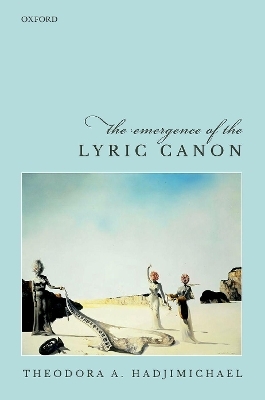
The Emergence of the Lyric Canon
Oxford University Press (Verlag)
978-0-19-881086-5 (ISBN)
The Hellenistic period was an era of literary canons, of privileged texts and collections. One of the most stable of these consisted of the nine (rarely ten) lyric poets: whether the selection was based on poetic quality, popularity, or the availability of texts in the Library of Alexandria, the Lyric Canon offers a valuable and revealing window on the reception and survival of lyric in antiquity.
This volume explores the complexities inherent in the process by which lyric poetry was canonized, and discusses questions connected with the textual transmission and preservation of lyric poems from the archaic period through to the Hellenistic era. It firstly contextualizes lyric poetry geographically, and then focuses on a broad range of sources that played a critical role in the survival of lyric poetry - in particular, comedy, Plato, Aristotle's Peripatetic school, and the Hellenistic scholars - to discuss the reception of the nine canonical lyric poets and their work. By exploring the ways in which fifth- and fourth-century sources interpreted lyric material, and the role they played both in the scholarly work of the Alexandrians and in the creation of what we conventionally call the Hellenistic Lyric Canon, it elucidates what can be defined as the prevailing pattern in the transmission of lyric poetry, as well as the place of Bacchylides as a puzzling exception to this norm. The overall discussion conclusively demonstrates that the canonizing process of the lyric poets was already at work from the fifth century BC and that it is reflected both in the evaluation of lyric by fourth-century thinkers and in the activities of the Hellenistic scholars in the Library of Alexandria.
Theodora A. Hadjimichael is WIRL Marie Skłodowska-Curie COFUND Fellow at the University of Warwick, UK. She previously held fellowships at Radboud University, Nijmegen in the Netherlands and at LMU Munich in Germany, and taught at the Open University of Cyprus. Her research focuses on Greek lyric poetry and its reception in antiquity as well as on ancient literary and cultural history.
Frontmatter
List of Maps and Figures
Conventions and Abbreviations
Note to the Reader
0: Introduction: The Lyric Canon
0.1: Canons and Canonization
0.2: The Emergence of the Lyric Canon: Chapter Layout
0.3: The Hermeneutic Framework: Reception and the Classic
1: The World of Lyric: Local, Pan-Hellenic, and Athenian
1.1: The World of Lyric: Lyric Geography and Travels
1.1.1: Local and Wandering Lyric Poets
1.1.2: Poetic Pan-Hellenism and Pan-Hellenic Poets
1.2: The World of 'Athenian' Lyric
1.2.1: Importing Lyric Poets
1.2.2: Monuments and Names
2: The Canonical Nine on the Comic Stage
2.1: Lyric Names for the Symposium
2.2: Melic Poems, Quotations, and Caricatures
2.3: Lyric Figures and Vivid Comic Portrayals
2.4: Recollecting Melic Poems and Recognizing Lyric Poets
3: Plato, Poetry, and the Lyric Nine
3.1: Lyric Poets: Authorities and Models of Inspiration
3.2: Awareness, Knowledge, and Recognition
3.3: Sophoi Lyric Poets and their Transhistorical Truths
4: The Peripatos: Aristotle's Project on Greek Culture
4.1: The Peripatetic Project
4.2: The Peri-treatises on the Lyric Poets
4.3: The 'Lyric' Library of the Peripatos
4.4: Passing on the Inherited Lyric Agenda
5: Towards a Written Text
5.1: Orality and/or Textuality?
5.2: Lyric Texts, Melic Performances, and Lyric Memory
5.3: The Sociology of Lyric Reception and Transmission
6: The Hellenistic Era: Lyric Texts and the Lyric Canon
6.1: Travelling Texts, the Library, and Scholarship
6.1.1: From Athens to the Alexandrian Library?
6.1.2: Working on Lyric Texts in the Library
6.1.3: Travelling Corpora and Travelling Poems
6.2: Canonizing Lyric: The 'Hellenistic' Lyric Canon
7: The Paradox of Bacchylides
7.1: The Alexandrian Bacchylides: Scholarship
7.2: The Alexandrian Bacchylides: Knowledge and Reputation
7.3: Traces of Bacchylides before the Hellenistic Era
8: Conclusion
Endmatter
Bibliography
Index Locorum
Subject Index
| Erscheinungsdatum | 19.07.2019 |
|---|---|
| Zusatzinfo | 2 maps and 4 black-and-white figures |
| Verlagsort | Oxford |
| Sprache | englisch |
| Maße | 161 x 238 mm |
| Gewicht | 708 g |
| Themenwelt | Geisteswissenschaften ► Philosophie ► Philosophie Altertum / Antike |
| Geisteswissenschaften ► Sprach- / Literaturwissenschaft ► Anglistik / Amerikanistik | |
| Geisteswissenschaften ► Sprach- / Literaturwissenschaft ► Literaturwissenschaft | |
| ISBN-10 | 0-19-881086-5 / 0198810865 |
| ISBN-13 | 978-0-19-881086-5 / 9780198810865 |
| Zustand | Neuware |
| Haben Sie eine Frage zum Produkt? |
aus dem Bereich


